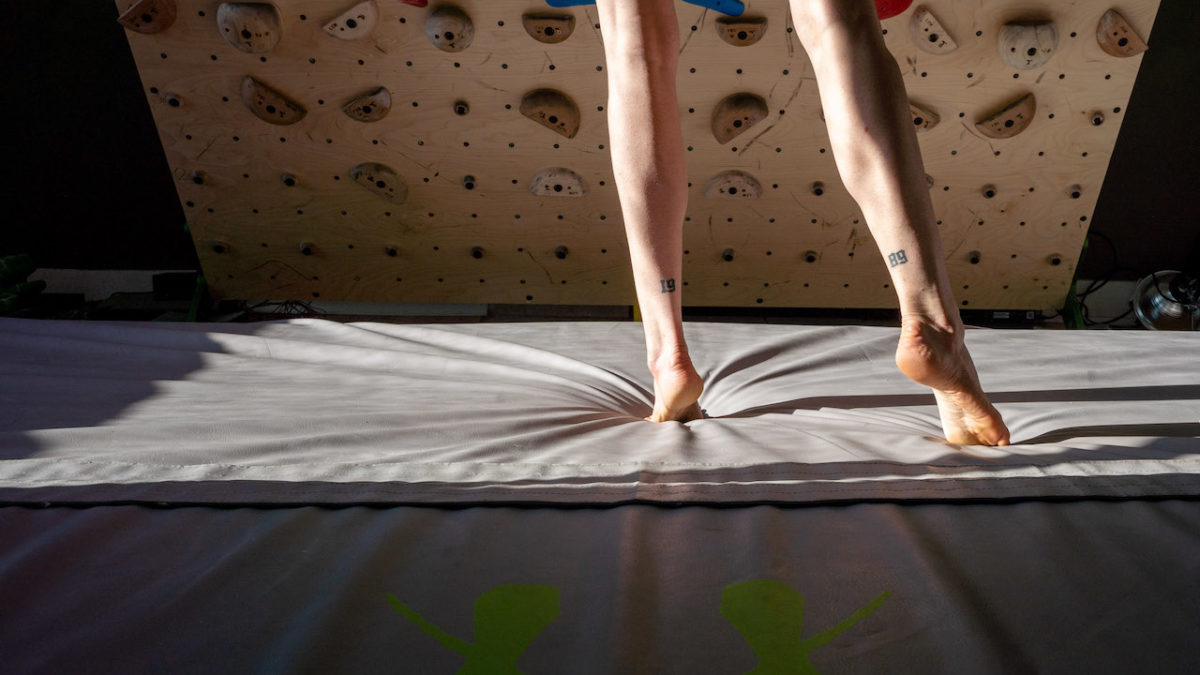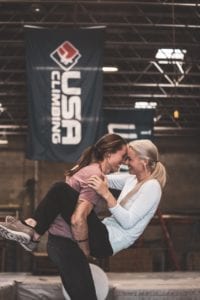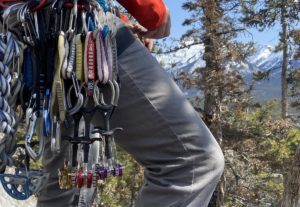Alex Johnson Talks About LGBTQIA+ Advocacy
World Cup gold medalist Alex Johnson discusses growing up in a community with limited LGBTQI+ representation
 Photo by: Bryana Robles
Photo by: Bryana Robles
“When young LGBTQIA+ athletes don’t see people who represent them in sport, then they don’t see a place for themselves.” – Joanna Hoffman, Director of Communications at Athlete Ally

*Editor’s note: Alex Johnson is one of the first LGBTQIA+ identifying athletes in American competition climbing, but she is not the first in outdoor rock climbing or mountaineering. There are many prominent examples of the LGBTQIA+ community in outdoor climbing such as Jamie Logan and Madaleine Sorkin.
Alex Johnson was born just 30 minutes outside of downtown Minneapolis where the young American would find the sport that she would ultimately help define.
At eight years old, she began climbing. She visited places like Taylor’s Falls Minnesota and by the age of 10, she was already learning how to compete compete. Two years later, and she would become the U.S. Youth National Champion. At 13, Johnson was the youngest “adult” National Champion in American history.
Johnson kept climbing throughout high school. A life-long athlete, she would hit the gym after playing other sports like volleyball, basketball and track-and-field. She tried to squeeze every ounce of potential out of her high school’s athletics department, and, already a national champion in climbing, went on to win State’s for pole vaulting. She received a scholarship opportunity from her soon-to-be university due to her outstanding performances. One year later, Johnson took on her first U.S.-based Bouldering World Cup and won. She was unstoppable.
Even with this success, Johnson’s time in high school was not easy. She suffered from bullying in middle and high school. It made her feel insecure.
“The first thing I would say about that is I don’t really know why. I always thought I was pretty cool,” Johnson laughed.
“I think being good at sports helped diffuse the bullying a bit, but it’s crazy how much that can really tank your confidence. I don’t even think I stood out. No one in my high school was LGBTQIA+, or, if they were, no one talked about it. I definitely wasn’t talking about it. I dressed to fit in and tried to fit in and tried to look the part. They must have known that I was different because I got zeroed in on.”
By Junior and Senior year (11th and 12th grade), Johnson started to feel more confident. Upon entering university, she found an opportunity to reinvent herself.

She continued to podium at World Cups and other competitions. Even as her reputation grew, the American remained insecure about her sexuality.
“I didn’t really have anyone to look up to or see as a role model. Especially in school, living in the Midwest, there was no one in the LGBTQIA+ community in my school. We had one gay boy, and everyone loved him, but they loved him as a token.”
Without a model to follow, Johnson maintained her secrecy. She remembered feeling alone. “I have no one to talk to, nobody knows who I am, I hate myself, why can’t I be normal?” It wouldn’t be until Johnson started her relationship with Bree Robles that her confidence would begin to build.
At first, Johnson felt like she had to keep her relationship a secret. She was afraid of the consequences coming out might entail.
Robles, ever supportive of her partner, suggested that it was not only okay for their relationship to be public, but that it was entirely normal. Johnson said, “Eventually, I felt safe with her. She was the first person I felt safe being out with publicly.”
In 2016, Johnson found herself battling through another challenging phase in her life that caused her to step back from climbing. As she tried to figure out who she would become, she lost an important sponsor. Johnson became jaded.
Joanna Hoffman, director of communications at Athlete Ally, an organization built to educate, advocate and create policy for the advancement of the LGBTQIA+ community in and through sport, discussed this seeming need for secrecy among professional athletes.
Hoffman said, “Given the history and current state of homophobia and transphobia in sports, athletes don’t always know how they’ll be received by their coaches, teammates, fans or sponsors if and when they come out. That’s why we need to proactively create a culture where they feel like they can come out and be welcomed for who they are.”
Johnson reflected this description. “I didn’t want it to affect me professionally. I had no idea how the industry would react.”

It would not be until Johnson moved back to Wisconsin that she changed her mind. She returned to climbing, and took a job as a youth coach. She had a team of 15 kids. One of them said, “I had a really bad day at school. I have to tell you something: I like girls… well… Are you homophobic?”
Naturally, Johnson replied, “Oh my god. Oh my god, NO. I am not homophobic.” It was in this moment that she thought about what her silence entailed. “I have done a major disservice to anyone in the climbing community that has been looking for someone to look up to. I went home and made my “coming out” Instagram post that day.”
This became the moment that catalyzed her advocacy for the LGBTQIA+ community in both climbing and sport. She reached out to Athlete Ally and said, “Hi, I love what you do and I want in.” Athlete Ally added Johnson to their list of ambassadors, a program designed to promote athlete advocacy.
Why athlete advocacy? According to Hoffman, “We know that athletes can reach people, across divides, especially across political divides, in ways that other people can’t.”
For Johnson, being an Athlete Ally ambassador is significant. “It is super important to be seen,” she said.
“I was so desperately looking for someone like me and couldn’t find them. This is super cheesy, but when Bree and I started dating, her Instagram bio was ‘Be who you needed when you were younger.’ I am trying to live up to that. If not on a personal level, then on a broader level where someone can say, ‘Oh cool! Someone like me.’ I think that if I had that person when I was younger, if I had a role model that was like, ‘You can do this, it’s going to be great,’ my childhood experience could have been different.”
Hoffman reflected on Johnson’s significance. “I think part of the reason that Alex has such a powerful impact is that she was inspired by thinking about herself when she was younger, when she was a young athlete growing up, and what a difference it would have made to see that kind of visibility. When young LGBTQIA+ athletes don’t see people who represent them in sport, they don’t see a place for themselves.”

Though Johnson has found significant support since her post in 2018, she wonders how much of that has to do with her previous reputation. She held back for so long because she recognized that the climbing industry is cis-male centred.
“If I am this straight, cute girl doing hard stuff, I’ll get more recognition,” said Johnson. It made sense for an athlete to provide themselves with the greatest number of opportunities.
“Traditionally, sports have not been safe or welcoming for LGBTQIA+ people,” said Hoffman.
“We know that at least 80 percent of LGBTQIA+ student-athletes aren’t out to their coaches about their sexual orientation or their gender identity. LGBTQIA+ youth are twice as likely to drop out of sports than their cis-gendered, heterosexual peers.”
This was only one of reasons why Hoffman believed sport to be such an important battleground for LGBTQIA+ advocacy. If sport is though to emulate society, then it’s clear that there’s still social progress to be made in climbing.
Johnson said, “As a country and as an industry and as a community, we are nowhere near as progressive as we think we are and that’s frustrating.”
Fortunately, the work Johnson has done has raised awareness for organizations such as Athlete Ally and has normalized conversations about sexuality in sport. One of the victories that Athlete Ally has won is called the Athletic Equality Index. Hoffman is proud of this progress. “The Athlete Equality Index is a ranking of how inclusive athletic departments are at NCAA schools. We have, in the past, ranked all Power Five schools, and are actually expanding it about three-fold this year, to rank all Division 1 schools. It is based on a set of criteria looking at how LGBTQIA+ inclusive their athletic departments are.”
For those of us at home looking to better the ways that we can be allies to the LGBTQIA+ community, Hoffman said, “We think of allyship as people who extend their empathy and compassion beyond their lived experience. It is an ongoing process. No one is ever an expert at being an ally, it’s something that we learn our whole lives.”
While this piece only touched on the many policies Athlete Ally has created, their stories, their policies and a place to donate can be found here.


